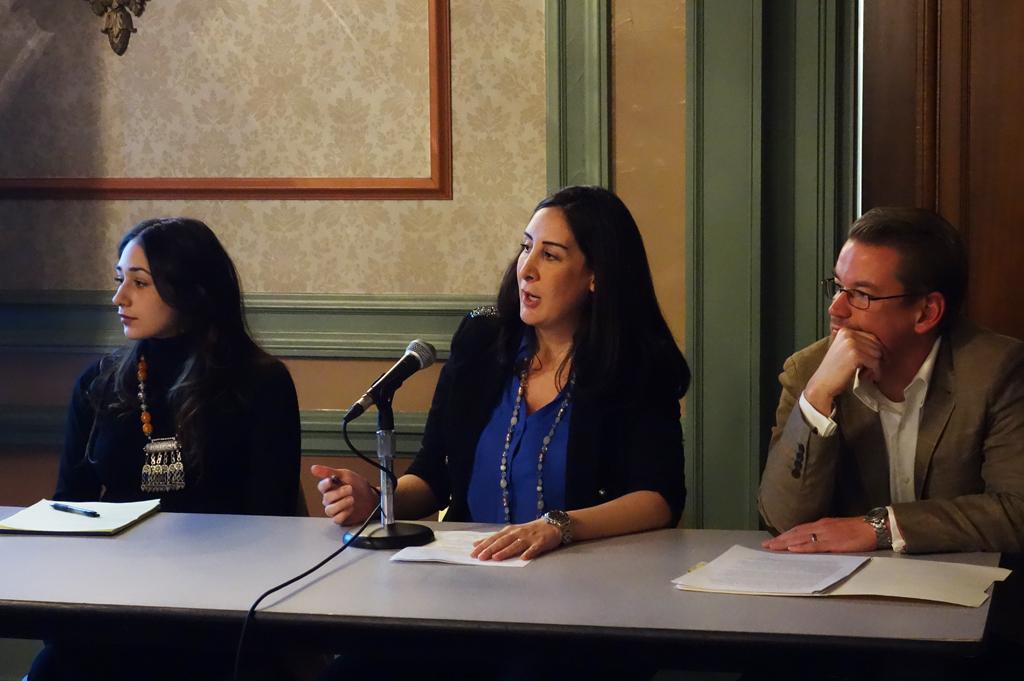After terror attacks, Pitt talks Syrian refugees


Panelists spoke about the "Crisis in Syria" on Saturday in the William Pitt Union. Wenhao Wu | Staff Photographer
As the shock of the attacks in Baghdad, Paris and Beirut, Lebanon, begins to fade, political leaders — and a group of Pitt students— met this weekend to discuss what will happen to the Syrian refugees.
On Saturday, Nov. 22, 100 people gathered in the Kurtzman Room of the William Pitt Union for the Syria Advocacy Event from 7 to 9 p.m. to hear speakers discuss the Syrian refugee crisis, or revolution. Facilitating Opportunities for Refugee Growth and Empowerment,which works with refugees in the Pittsburgh area and abroad and has a student branch at Pitt, hosted the event.
In order to help students grasp the bigger picture and gain a new perspective on the issue, three speakers with different backgrounds gave 15 minute talks before opening up the room for a Q&A-format discussion.
Junior Laila Al-Soulaiman, a political science major who spoke at the event, said she insists on calling the refugee crisis, which grew since the start of the Syrian revolution in 2011, a revolution to bring attention to the real issues that many misunderstand.
“It is a civil war, yes, but I think that the word revolution is also an accurate depiction that is frequently lost,” Al-Soulaiman said. “It’s a shame to forget the conflict’s roots.”
Although FORGE hosts a refugee advocacy event every fall semester, the recent attacks drastically changed the international attitude toward refugees in one week, making the conversation more important than ever, according to senior Apoorva Kandakatla, co-president of FORGE.
President Obama announced his support for accepting refugees while governors from 30 states have said they will refuse to accept them. French President Francois Hollande committed to accepting 30,000 refugees over the next two years, despite fear throughout the country.
There are two major sides to the conflict: those who are pro-Assad and those who feel the Assad regime needs to end — which is the majority opinion — according to Luke Peterson, professor in the global studies department.
“I feel like everyone has kind of heard about the refugee crisis that’s going on, but I feel like a lot of them don’t really know that big picture about it,” Kandakatla said.
Mais Haddad, a Syrian lawyer and human rights activist, spoke first on ISIS and its involvement in the refugee crisis.
Haddad called on able countries to take in refugees and stop blaming them for ISIS attacks.
At the end of her piece, she posed a question to the room, directed at governors publicly blocking refugees from entering states: If you can’t distinguish between a refugee and a terrorist, how can you distinguish between a rebel and a terrorist?
Pennsylvania Gov. Tom Wolf said the state will accept refugees, despite protests from state legislators, and has asked lawmakers for suggestions on beefing up the screening process.
Mayor Bill Peduto, an early supporter of refugees, was one of 18 mayors to sign a letter in September to President Barack Obama urging him to increase the number of refugees the United States will accept.
The rhetoric surrounding the refugee crisis is political, Al-Soulaiman said, and presidential candidates who do not support taking in refugees use language such as “swarming” to inaccurately describe how Syrians are entering the country.
“We know how war works, but when we say, for example, that 130 people died today in Syria, how did they die? Specificity is important,” Al-Soulaiman said.
Using precise language, such as differentiating between terrorists and rebels, to specify and humanize the crisis is an important way to shift the conversation, Peterson said.
“The term rebel versus refugee, the term terrorist versus asylum seeker, contribute to different frames of knowledge and different intellectual appreciation of events in the world, so we have to be very specific about the language we use, and we should be very vigilant in counteracting deliberately misleading terms,” Peterson said.
On Thursday, a bill passed in the House that would block Syrian and Iraqi refugees from entering the United States unless they pass a strict background test. The Senate will vote on the bill when it resumes session Nov. 30.
Although many throughout the country fear refugees, discussion attendees were firm in saying that the United States should accept them.
“I don’t think that matters, like how hardworking someone is or what they contribute [are important], because everyone’s life is inherently valuable. And if you’re trying to escape persecution, then we should help you,” junior Christin Adams said.
According to Peterson, Syria can either continue on as an anti-democratic regime or reconstitute itself as a democracy where all people are equal.
Regardless of what side people stand on, the speakers encouraged the audience to support refugees in any way they can.
“[We should take in refugees] because they are humans in need and we have the capacity to do so,” Al-Soulaiman said.
Recent Posts
Opinion | School should be in the summer
Although this may be controversial, I believe that from this data, it is evident that…
Weathering the storm: Pittsburgh teams have tackled some of the toughest environments
The end of the year in western Pennsylvania is always marked by two things —…
Notes From an Average Girl // Notes on Book Banning
In this edition of Notes From an Average Girl, senior staff writer Madeline Milchman writes…
To Be Honest // Yup, it is that damn phone
In this edition of To Be Honest, staff writer Evin Verbrugge writes about her phone…
Meaning at the Movies | Portraying Toxic ‘Adolescence’
In this edition of Meaning at the Movies, staff writer Lauren Deaton explores the mini-series…
Opinion | Climate change requires radical, immediate action
Contributing editor Emma Hannan talks about the effects of climate change and the actions cities…

